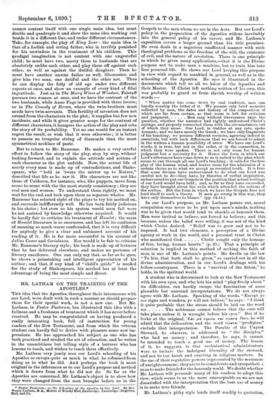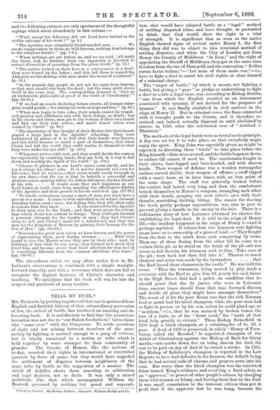MR. LATHAM ON THE TRAINING OF THE APOSTLES.*
THE idea that the Apostles, throughout their intercourse with our Lord, were dealt with in such a manner as should prepare them for their special work, is not a new one. But Mr. -Latham, in Pastor Pastorum, has illustrated this idea with a fullness and a freshness of treatment which it has never before received. He may be congratulated on having produced a really interesting book, full of instruction for young readers of the New Testament, and from which the veteran student can hardly fail to derive with pleasure some new im- pressions. He has approached his subject as one who has both practised and studied the art of education, and he writes in the unambitious but telling style of a lecturer who has lessons to teach, and wishes to teach them effectively.
Mr. Latham very justly sees our Lord's schooling of his Apostles or envoys quite as much in what he refrained from doing as in what be did. And perhaps the book is most original in the inferences as to our Lord's purpose and method which it draws from what he did not do. So far as the Apostles are concerned, Mr. Latham's object is to show how they were changed from the men brought before us in the
• Pastor Pastorvin ; or, the Schooling of the Apostles by Our Lord. By Rey. Penry Latham, M A., Master of Trinity Hall, Cambridge. Cambridge: Deighton, Sell, and Co.
Gospels to the men whom we see in the Acts. But our Lord's policy m the preparation of the Apostles widens inevitably into the general policy of his career, and Mr. Latham's exposition covers a larger ground than his title promises. He even deals in a sagacious unaffected manner with such theological problems as the freedom of the will, the existence of evil, and the nature of revelation. There is one principle to which he gives many applications,—that it is the Divine purpose not to. make man a machine, but to train him into free personal life. He shows our Lord keeping this purpose in view with • regard to mankind in general, as well as in the schooling of the Apostles. He srs it illustrated in the documents which tell us all we know of the Apostles and their Master. If Christ left nothing written of his own, this was probably to guard us from slavish worship of written words :-
"When matter has come down by oral tradition, men can hardly worship the letter of it. We possess only brief memoirs collected by men, the dates and history of the composition of which are far from certain, so that room is left for criticism and judgment Men may without irreverence raise the question, whether the narrator had rightly understood Christ's sayings, and properly connected them with the circumstances out of which they arose. Our Lord, in Galilee at any rate, spoke Aramaic, and we have merely the Greek ; we have only fragments of his teaching; we possess different versions, agreeing indeed in essentials, but with such differences that we are forced to admit in the writers a human possibility of error. We have our Lord's words, it is true, but not in the order, or in the connection, in which they were spoken. There is not only room for human judgment but a necessity for it. Hence the form in which our Lord's utterances have come down to us is suited to the plan which seems to run through all our Lord's teaching ; it calls for the free play of the human mind, and leaves room for the admission of a certain choice as to what we accept as revealed truth. It is true that some divines have endeavoured to do what our Lord was careful not to do—they have, by theories of verbal inspiration, endeavoured to put our Gospels in the position that actual writings of our Lord would have held ; and, so far as they have succeeded, they have brought about the evils which attended the notions of the scribes. But the form in which we have the Gospels does not lend itself to such a theory. If men go wrong in this way, they have only themselves to blame." (pp. 14-15.)
In our Lord's purpose, as Mr. Latham points out, moral compulsion was never to be put upon men's minds, nothing was to be given that would tend to shackle or benumb them.
Men were invited to believe, not forced to believe; and this because, unless the belief were willing, it was not of the kind which Christ desired. " Belief was to grow and not to be imposed. It had two elements, a perception of a Divine agency at work in the world, and a personal trust in Christ who manifested God Christ sought only the homage of free, loving, human hearts." (p. 25.) That a principle of selection is implied in this method of seeking the faith of men, is one of Mr. Latham's points. He dwells on the law " To him that hath shall be given," as carried out in all the divine administration, and in our Lord's dealings with his fellow-countrymen. There is a " survival of the fittest," he holds, in the spiritual world.
A student who is determined to look at the New Testament with his own eyes, and who lets his mind " play freely about " its difficulties, can hardly escape the fascination of some plausible but unsound interpretations. We do not always agree with Mr. Latham. Speaking of the words, "Except ye see signs and wonders, ye will not believe," he says : " I think it quite probable that the stress should be laid on the word
see The nobleman cannot believe that the cure will take place unless it is wrought before his eyes." But if he looks at the original, 'Bah, pt) onizEla Kati riposres nal% he will admit that the collocation, and the word Tipareg, "prodigies," exclude that interpretation. The Parable of the Unjust Steward, he observes, is addressed to " the disciples," who had no money ; and therefore, he says, it cannot be intended to teach a good use of money. The lesson of it, he suggests, is that ecclesiastical administrators were to imitate the indulgent liberality of the steward, and not be too harsh and exacting in religions matters. In the use of their regulative powers (represented by the mammon of nnrighteousness), they are to be considerate and sympathetic so as to make friends for the heavenly world. We doubt whether Mr. Latham will persuade many of his readers to adopt this view, which seems to us the more unacceptable as we are not dissatisfied with the interpretation that the best use of money
is to make true friends.
Mr. Latham's pithy style lends itself readily to quotation, and the following extracts are only specimens of the thoughtful sayings which occur abundantly in this volume :—
" What, except his followers, did our Lord leave behind as the visible outcome of his work P " (p. 3.)
"The Apostles were singularly literal-minded men. . . . . . We see no exaggeration in them, no wild fervour, nothing that belongs to the religious fanatic." (pp. 7-8.) " When writings are set before us, and we are told, All truth lies there, look no further,' then our ingenuity is diverted to extract diversities of meanings from the given words." (p. 13.) " The scribes looked on their Law as a conveyancer on a deed : they were bound by the letter ; and this led them to regard the Almighty as One dealing with men under the terms of a contract." (p. 14.) "In the present day, people do not ask for signs from heaven, or that men should rise from the dead ; but the same spirit shows itself in the same way. The corresponding demand is, Give us an undeniable philosophical proof of the truth of Christianity.' " (pp. 63-64.) " If we had an oracle declaring future events, all human enter- prise would perish,—for enterprise rests on hope and fear." (p. 66.) " When men begin to take sides, their minds cannot lie torpid : evil passion and selfishness mix with their doings, no doubt ; but
in the storm and stress, men get to the bottom of their own hearts and find out their true selves ; and men's truest selves were wanted by Christ." (p. 82.) " The knowledge of this insight of their Master into their hearts played a large part in the Apostles' schooling. They were
habituated by means of it to feel that their hearts were known, and this habit became so much a part of themselves, that when Christ bad left the world they could realise to themselves that they were under his eye still." (p. 110.) " When sect strives with sect, and they would decide the contest for superiority by counting heads, they are both in a way to fall down and worship the Spirit of the world." (p. 173.) " Gleams of gladness in our Lord's career come rarely, and his joy is always for others' sake. It is not for himself, not even for the cause, that he rejoices,—that cause would surely triumph in its own time,—but his joy is that he beholds a successful and glorious career opening before his fellow-labourers, the few friends at his side It would seem that such happiness as our Lord found on earth came from marking the affectionate fidelity of the Apostles and their growth in favour with God. (pp. 177-78.) " To kindle enthusiasm among a mass of men, you must have a person or a name. A cause is best embodied in an actual claimant standing before men's eyes ; but failing this, they will often rally to a name that they know It was reserved for the Apostles to draw men over to the Faith ; and they were given the advan- tage which Jesus was content to forego. They could put forward a personal claimant for the loyalty of men : they bad Christ's story to tell and Christ's name for a watchword, and they won men for the Kingdom of Heaven by gaining their homage for the Son of Man." (pp. 184-85.) "Reverence for great men whom we have known, and the power of appreciating them, grow during absence First they learnt to love the Master whom they saw by their side; next, by thinking of him while he was away, they learned how much they loved him, and became aware that their affection for him had in it something different from the common affections they knew." (pp. 186-87.)
The shrewdness which we may often notice first in Mr. Latham's observations is combined with a simple straight- forward sincerity, and with a reverence which does not fail to recognise the highest features of Christ's character and teaching. We anticipate that his book will win for him the respect and gratitude of many readers.



































 Previous page
Previous page